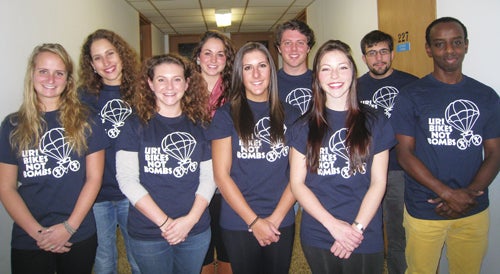Spokes for Folks, Global Edition

One country’s garage decor is another country’s game-changer. That’s what a group of political science students concluded after Associate Professor of Political Science Kristin Johnson told them about Bikes Not Bombs, an organization in Jamaica Plain, Mass., that collects and renovates 6,000 bikes per year and ships them to Africa, Latin America, and the Caribbean.
So they started a months-long drive, eventually collecting 80 used bikes, including racers and high-end mountain bikes, from the Newport Police Department, community groups, bike clubs, and individuals. After reading about the economic and political hardships in Ghana and in Uganda, where the northern part of the country has been ravaged by a brutal civil war, they asked Bikes Not Bombs to transport the bikes to the two countries.
In Uganda, the bikes will help health care workers reach sick people in remote villages—crucial since medical workers are in short supply, especially in rural areas. In Ghana, the bikes will go to a cooperative bike shop staffed by people who are physically challenged, mostly from polio.
“Mobility is a huge issue in Africa,’’ says Elizabeth Dore-Welch, a political science graduate student who spearheaded the project. Ibrahim Nour ’15, who grew up in the Republic of Chad in Central Africa and was also part of the project, agrees. “A bike can change a life,” he says. “It will help a person travel from village to village for a job, or it can be used to transport water. There are hundreds of examples.’’ More at bikesnotbombs.org.
 Home
Home Browse
Browse Close
Close Events
Events Maps
Maps Email
Email Brightspace
Brightspace eCampus
eCampus


